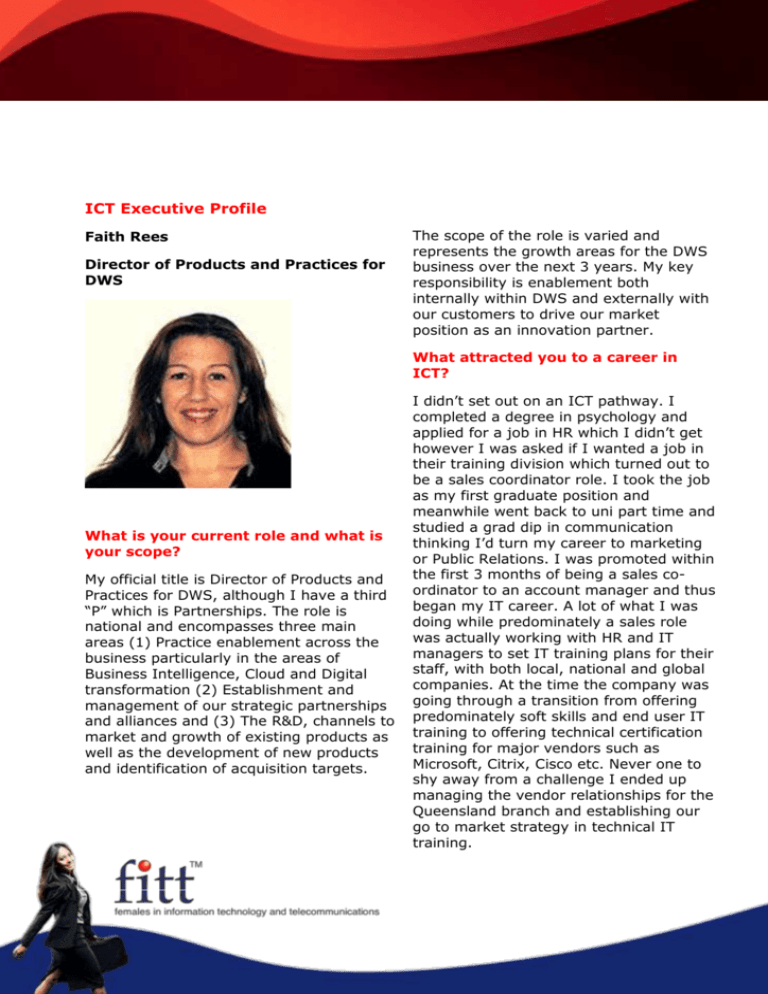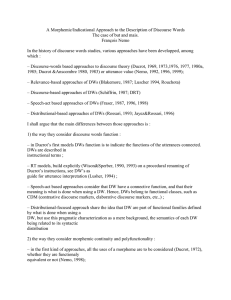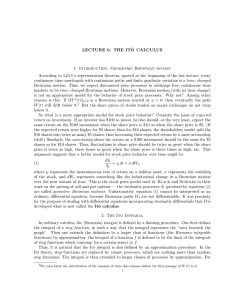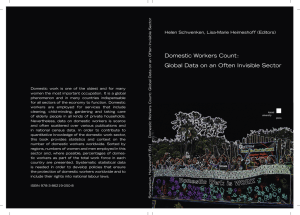Faith Rees
advertisement

ICT Executive Profile Faith Rees Director of Products and Practices for DWS The scope of the role is varied and represents the growth areas for the DWS business over the next 3 years. My key responsibility is enablement both internally within DWS and externally with our customers to drive our market position as an innovation partner. What attracted you to a career in ICT? What is your current role and what is your scope? My official title is Director of Products and Practices for DWS, although I have a third “P” which is Partnerships. The role is national and encompasses three main areas (1) Practice enablement across the business particularly in the areas of Business Intelligence, Cloud and Digital transformation (2) Establishment and management of our strategic partnerships and alliances and (3) The R&D, channels to market and growth of existing products as well as the development of new products and identification of acquisition targets. I didn’t set out on an ICT pathway. I completed a degree in psychology and applied for a job in HR which I didn’t get however I was asked if I wanted a job in their training division which turned out to be a sales coordinator role. I took the job as my first graduate position and meanwhile went back to uni part time and studied a grad dip in communication thinking I’d turn my career to marketing or Public Relations. I was promoted within the first 3 months of being a sales coordinator to an account manager and thus began my IT career. A lot of what I was doing while predominately a sales role was actually working with HR and IT managers to set IT training plans for their staff, with both local, national and global companies. At the time the company was going through a transition from offering predominately soft skills and end user IT training to offering technical certification training for major vendors such as Microsoft, Citrix, Cisco etc. Never one to shy away from a challenge I ended up managing the vendor relationships for the Queensland branch and establishing our go to market strategy in technical IT training. Tell us about the highpoints and lowpoints of your career? I’ve had several high points in my career, but the most recent would be my promotion to Chief Operating Officer and appointment as a board director to my previous employer Readify. Becoming the Chair of IT Queensland (and being the first female in the position) and my latest promotion at DWS, starting just on 12 months ago as their GM for Queensland and being promoted after 8 months to my current role. Also being nominated for a Pearcy Award. I’ve not experienced too many low points, there are times when you need to continually evaluate your career and sometimes where you thought you wanted to be doesn’t match the reality of what you wanted and so making the hard decision to walk away from the “title/ role/opportunity” when it doesn’t align to your moral compass is sometimes very hard to do. The overall low point is that inequality in pay scales for female executives is still very real and something I have fought my entire career. What does work life balance mean to you? I think work life balance means very different things to everyone. I enjoy work and probably by most people’s definition spend too much time working. I don’t have children which has caused me a few headaches in terms of people’s perceptions around what should and shouldn’t be acceptable hours for me compared with colleagues who do have children and expectations placed on me above those with “family commitments”. I still have a life I’ve gotten better with setting boundaries around work hours and I choose when I want to work and I don’t expect that just because I’m online that my staff should be. I’ve also gotten better at pushing back when my work life starts to consume my other priorities (it’s a continuous learning). We have busy jobs and busy lives, each person needs to decide what their priorities are and set your work and life around those. If you want a senior position though while most organisations have become much better at flexibility in the workplace you can’t escape the fact that at times work will impede on your personal life, if you don’t want that, don’t take the job or work out how you are going to make it work for you. Set your priorities, none of us are superhuman, we can’t do everything. Re-work your life to align to your priorities if you can afford to, outsource the things that you don’t like doing and make more time to do things you want and don’t feel guilty about it. What attracted and kept you in the ICT industry throughout your career? The ICT industry is ever changing, no day is the same and technology advancements continue to amaze me, so you are constantly learning. Generally ICT affords you greater flexibility in where and how you work and you work with such a diverse array of people. You learn highly transferable skills and can work across all industries and companies. I have also been fortunate that I have generally been able to create the role I want within the companies I have worked and have been afforded the trust, respect and resources to succeed. Often if you have a good idea you have the opportunity to make that a reality. In terms of promotion and opportunities in ICT I have never felt my gender has been a factor. What ambitions personal or professional do you still want to achieve? Personal there are still sooo many things, certainly exploring the world more is on the top of my list and finally getting my house renovations finished this year! On a professional level I will look to future board appointments most likely with ICT startups for which I have a real passion and at some point look to my own startup (which I’ve dabbled in previously). I’ve still a lot to achieve in my current role with a rather big to do list. What’s the one piece of advice you'd give to yourself starting out on your career? Take more risks! NB: As appeared in FITT e-newsletter February 2015 and also features on the website. Become a member and find out more about us on www.fitt.org.au Connect with us LinkedIn, Facebook & Twitter!











